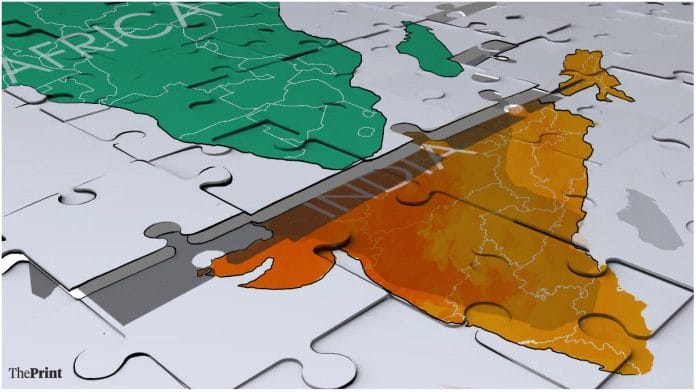New Delhi: After a nine-year gap, India and the African Union, now part of the Group of Twenty (G20), are set to hold the fourth India-Africa Forum Summit (IAFS) later this year, ThePrint has learnt.
A delegation from the African Union met with the Indian ministry of external affairs (MEA) last month to discuss the preparations for the summit, diplomatic sources told ThePrint.
The IAFS is the chief political institutional mechanism between New Delhi and 54 countries of the African continent under the African Union. The last IAFS, held in New Delhi in 2015, saw representatives from all 54 countries, including 40 heads of state, in what was the largest gathering of African leaders in India.
Several heads of state will likely participate in the 2024 summit, the venue of which is yet to be finalised. It will, however, likely be held in Addis Ababa, Ethiopia.
As India ramps up its engagement with Africa, ThePrint, in a three-part series, will look into India’s defence diplomacy, investment, and trade with the continent. This is the first in this series.
The upcoming summit is part of a 2008 initiative by the Manmohan Singh-led United Progressive Alliance (UPA) government and was to be hosted every three years. In 2015, however, it was decided to hold the fourth summit in 2020. The COVID-19 breakout, however, delayed the summit further.
“The last India-Africa Forum Summit was held in 2015 in New Delhi. Since then, a lot has changed geopolitically, economically, and global priorities. In order to build on the successes of earlier summits and to cater to the needs of the evolving global landscape, it is imperative that India hosts the fourth summit. Otherwise, it will appear that Africa has fallen behind in India’s foreign policy,” Samir Bhattacharya, an associate fellow at the Observer Research Foundation (ORF), told ThePrint.
Africa is resource-rich, especially in the energy sector, and India lacks that, Bhattacharya added.
By 2050, the total population of Africa is forecast to touch 2.5 billion, or roughly 25 percent of the world’s total population. With roughly 1.4 billion people today, its economy is estimated to be close to $3 trillion.
In recent years, India has been trying to increase its diplomatic outreach to African countries, from increasing its diplomatic presence in the continent to spearheading efforts to make the African Union (AU) a permanent member of the G20, the premier forum for international economic cooperation, finally achieved in 2023 during the India presidency of the G20 summit.
Earlier in 2022, Indonesia, when it held the presidency of the G20, also endorsed the idea of making the AU a permanent member of the grouping. This was supported by various members of the international forum.
India has also succeeded in opening 17 new diplomatic missions across the continent since 2018, according to the MEA.
Also read: A forgotten mass exodus in India — Japan created fear of invasion in 1942, emptied out cities
Modi’s 10 principles, China & IAFS
In 2018, Prime Minister Narendra Modi unveiled India’s 10 “guiding principles” for ties with African countries during a speech in the Ugandan parliament.
These were: Africa is a top priority for India, India’s development partnership will be guided by African priorities, promoting trade and investment between Africa and India, exporting India’s digital revolution to the continent, cooperating in agriculture, addressing climate change, combatting terrorism and extremism, maritime security, promoting global engagement in Africa and reforming global institutions, and ensuring greater representation for Africa.
As a part of India’s development partnership with African countries, the Export-Import Bank of India (Exim Bank), one of India’s major external financing institutions, has extended close to $11.2 billion through lines of credit (LoCs) to African countries for 197 projects till 15 February, 2024.
An LoC is a concessional credit facility extended by the Indian government to overseas governments or their nominated agencies in developing countries for financing different kinds of projects, including civil works and procurement of goods.
“The Indian approach to development support is different. It looks at the needs of its partners with no conditions attached,” Demeke Atnafu, the Ethiopian ambassador to India, told ThePrint.
India has also looked to partner with third countries to help fund development projects in Africa. Between 14-15 May, India and the US will explore ways to develop “institutional, technical and bilateral synergies” to work together in Africa.
India has also been engaging in trilateral development projects in Africa with other partner countries such as Germany and France in recent years.
Last month, it was reported that India will also be expanding its defence diplomacy in Africa, with the appointment of new defence attachés in Ethiopia, Mozambique, the Ivory Coast and Djibouti.
The expansion of this strategic footprint coincides with India looking to export arms and military aircraft to African countries, several of whom have already started buying.
Economic ties between India and countries in Africa touched $100 billion during the 2022-23 financial year, and in the 2023-24 financial year till February, it has crossed $75 billion, making up nearly a tenth of India’s total trade in goods.
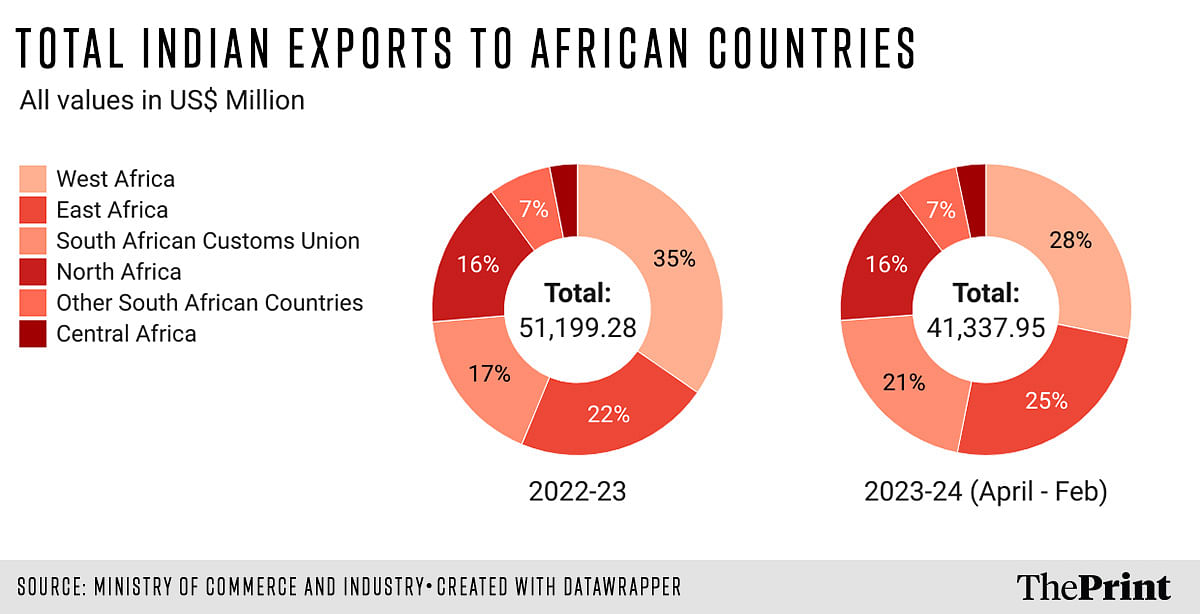
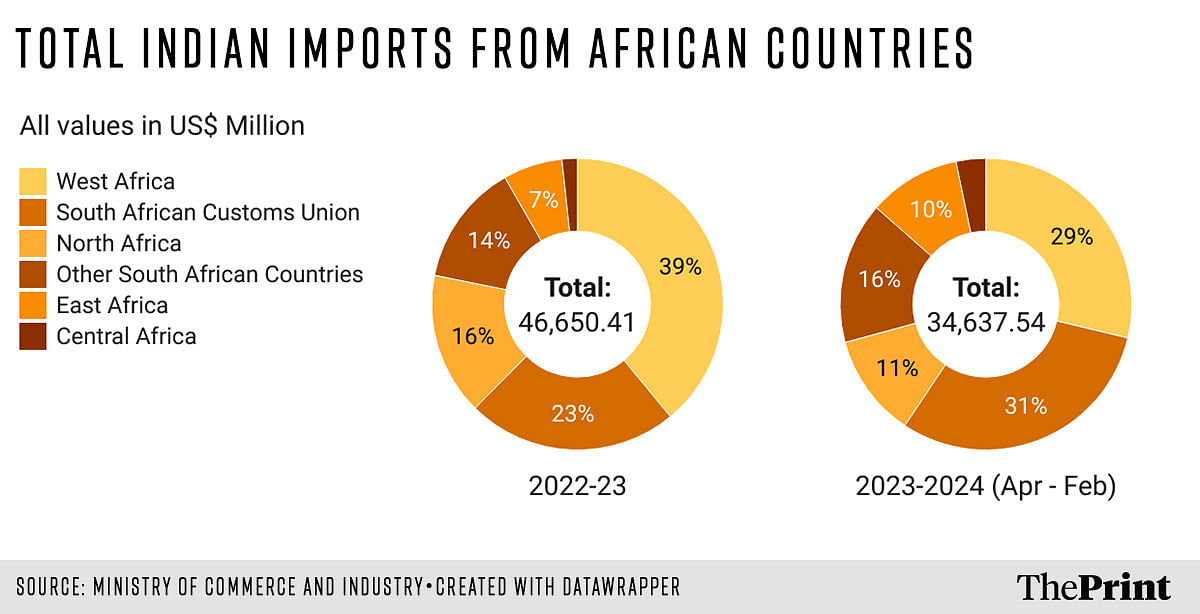
However, it’s not just India that is keen to build relations with Africa. China has had a head start. Between 2000 and 2021, Beijing has lent through loans and grants close to $326 billion to African countries, according to AidData, a research lab at the College of William and Mary. In 21 years, Chinese funding helped 7,985 projects in nearly every African country.
Energy and transport sectors accounted for nearly half of all Chinese funding, close to $153 billion, reported AidData. Moreover, Djibouti is home to China’s first foreign military base, showing how the country has slowly yet steadily built ties across the continent.
Apart from loans and grants, China has also been hosting the Forum on China-Africa Cooperation (FOCAC) every three years since 2000. It began first as a ministerial conference before being upgraded in 2006 to an international summit. In 2021, the forum went online at the height of the pandemic. The next FOCAC summit will be in the autumn of this year, according to Wang Yi, the Chinese foreign minister.
Also read: Iranian Army a ‘stabilising force’ in Persian Gulf, says India’s Military Intelligence chief
Expanding diplomatic footprint
India’s diplomatic footprint has increased across the continent since 2017. India announced its plan to open 18 new missions in Africa in 2018. Of the 18 proposed missions, 17 have been made operational, according to the MEA.
The 17 new missions are in Burkina Faso, Cameroon, Cape Verde, Chad, Republic of the Congo, Djibouti, Equatorial Guinea, Eritrea, Guinea, Liberia, Mauritania, Rwanda, Sao Tome and Principe, Sierra Leone, Somalia, Eswatini (Swaziland), and Togo.
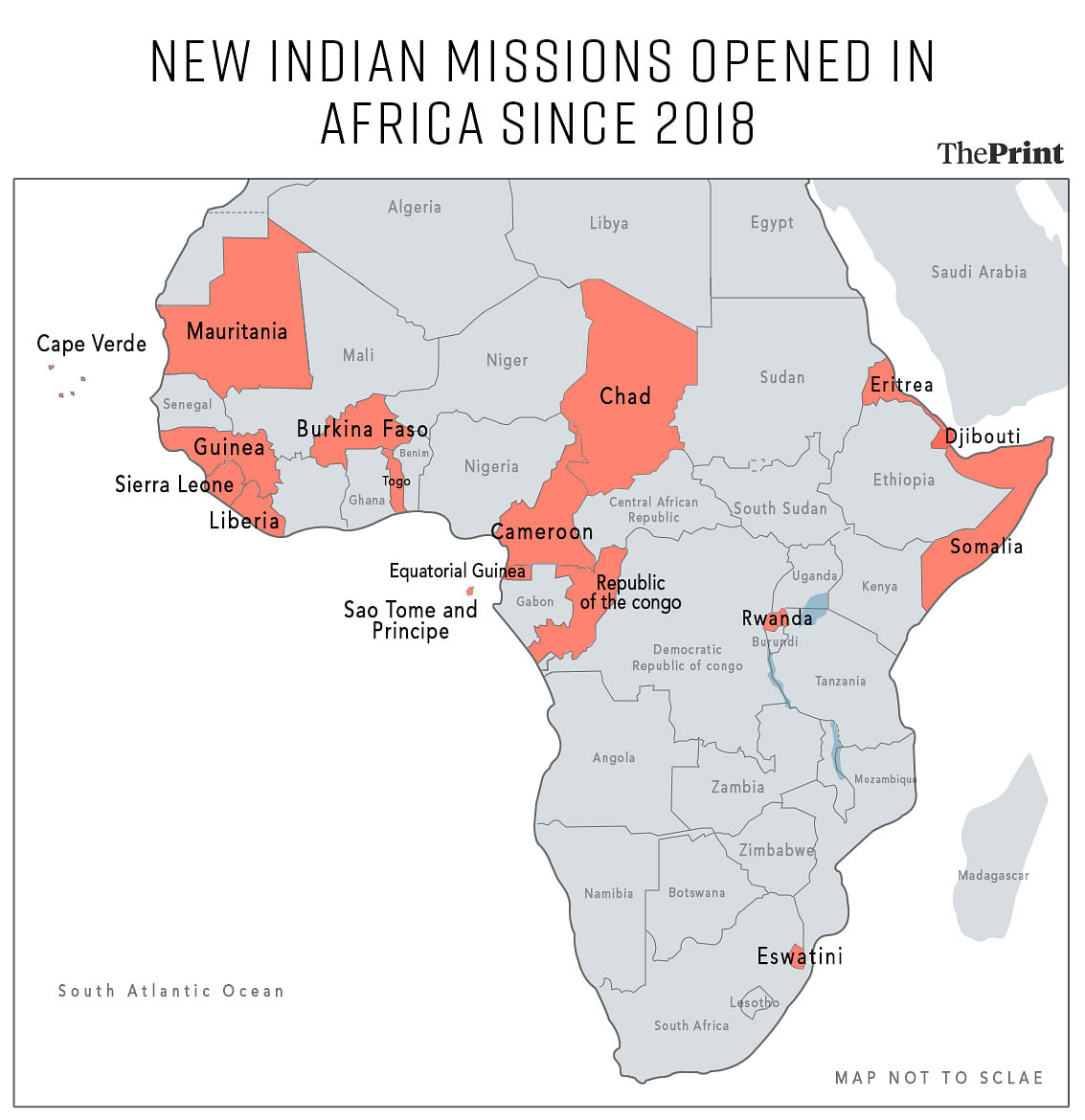
These new missions make up a majority of India’s total new missions opened in the last seven years — 22, as reported by ThePrint earlier.
Moreover, Indian External Affairs Minister S. Jaishankar has made it a point to visit different African countries every year since he was made a part of the Union cabinet in 2019.
During his ministerial tenure, he has visited at least 13 African countries, including Ethiopia, Uganda (twice), Nigeria, Namibia, South Africa, Mozambique, Tanzania, Egypt, Kenya, Mauritius, Seychelles, Tunisia, and Niger.
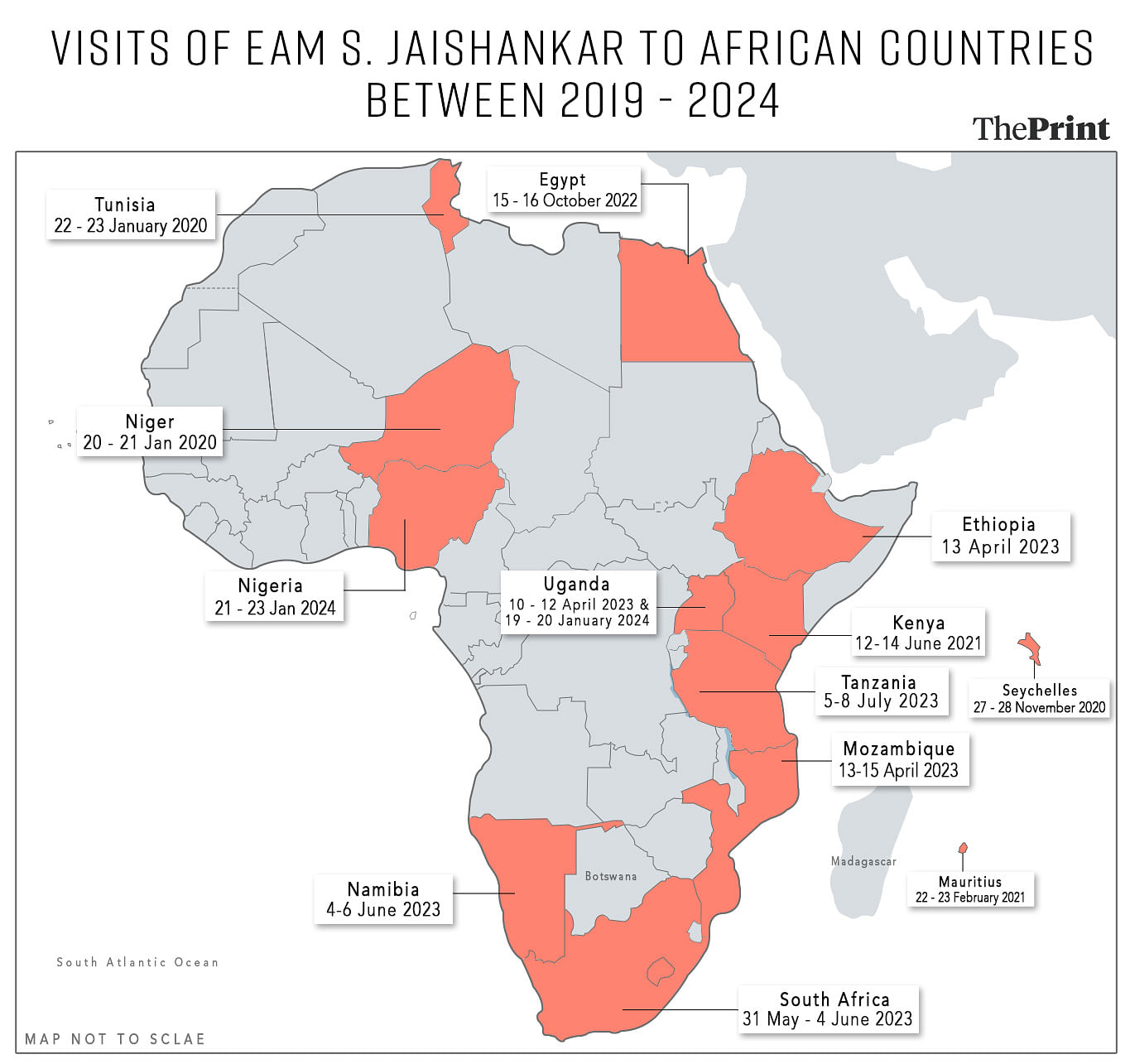
Former president of India Ram Nath Kovind’s first visit abroad was to Djibouti and Ethiopia from 3-6 October, 2017, followed by visits to Mauritius, Madagascar, Equatorial Guinea, Eswatini, and Zambia between March and April, 2018. In 2019, he visited Benin, The Gambia, and Guinea.
His visits to Equatorial Guinea and Eswatini were the first visits by an Indian head of state or head of government to those two countries.
Similarly, former vice-president of India Venkaiah Naidu led numerous high-level delegations to African countries, including Botswana, Zimbabwe, Malawi, Comoros, Sierra Leone, Gabon, and Senegal.
His visits to Comoros and Sierra Leone were the first high-level visits from India to those countries, while his tours of Gabon and Senegal were the first by an Indian vice-president.
During his tenure, PM Modi has visited at least nine African countries, including Uganda, South Africa, Egypt, Kenya, Mauritius, Seychelles, Mozambique, Rwanda and Tanzania. The majority of his visits were during his first term.
While India has been diplomatically active through multiple high-level visits over the years, its key strength is modern and ancient historical ties with the African continent. For instance, the founding of the Non-Aligned Movement (NAM) and its support for the decolonisation of the African continent found broad support from India.
The Indian government helped set up the first military officers’ training centre in Ethiopia, and Sudan’s first election in 1953 was conducted with help from then-Indian Chief Election Commissioner Sukumar Sen to name a few of the interesting examples of New Delhi’s engagement with the continent in the 1950s and 1960s.
Moreover, the two countries, said Ethiopian ambassador Atnafu, have been trading with one another for at least “2,000 years”, highlighting the soft power link between New Delhi and various African countries.
Also read: Quad, migration, sports diplomacy – India & New Zealand’s bilateral ties growing, says NZ envoy
Defence and economic ties
While the diplomatic and political engagement between India and African countries has remained steady through the years, New Delhi has attempted to expand its economic and defence links with the continent.
“Trade and investment are the principal tenets of the economic partnership between India and Africa, and over the previous two decades, significant progress has been made in this regard. Indian trade with Africa is valued at USD 98 billion in 2022–2023 compared to USD 89.6 billion the year before,” said Bhattacharya to ThePrint.
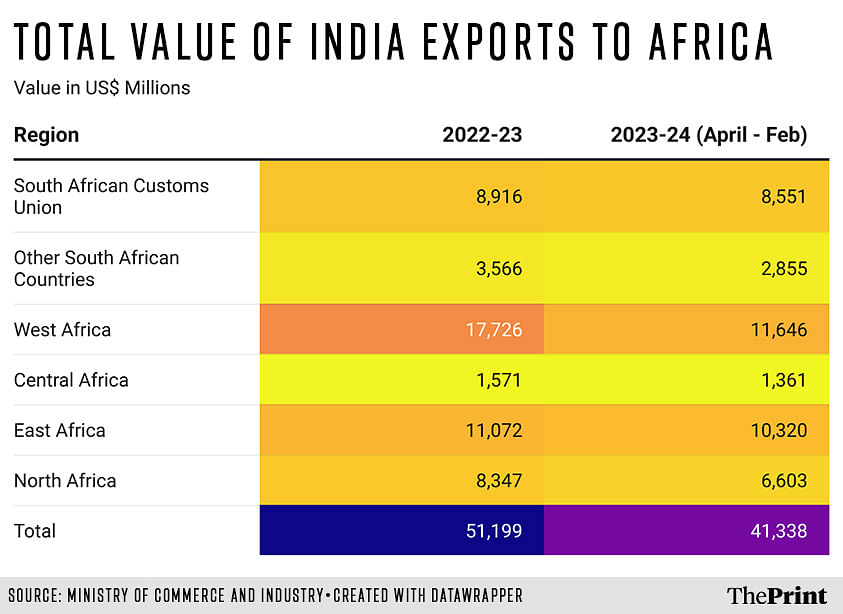
Africa, Bhattacharya added, offers many “unexplored markets” for Indian manufacturers, including in textiles, pharmaceuticals, automobiles and light machinery. The continent also potentially provides resources, especially in the energy sector, a “traditional weak point” for India, Bhattacharya said.
There is optimism in this regard among some sectors of Indian businesses, with at least six business delegations across sectors such as chemicals, textiles, and pharmaceuticals visiting Ethiopia alone in the last year.
Ambassador Atnafu toldThePrint that there are at least “650-670” Indian companies operating in Ethiopia across various sectors today.
“Agriculture is an appropriate sector to harness Indian knowledge. The successful green revolution in the country is an example from which Ethiopia can benefit,” said Atnafu, indicating some of the areas New Delhi can potentially target.
In 2016, India announced it would import 1,00,000 tonnes of pulses from Mozambique — an example of New Delhi promoting contract farming.
The Indian government is also looking towards Africa to achieve its goal of exporting $5 billion worth of defence equipment by 2025.
“As the ministry of defence aims for 5 billion dollars of defence export by 2025, Africa will undoubtedly have a large chunk of it. Between February and July 2015, Ashok Leyland supplied 1,200 vehicles to six African countries — Zimbabwe, Tanzania, Kenya, Djibouti, Seychelles and Botswana,” said Bhattacharya.
He added, “In July 2015, Ashok Leyland delivered 633 of 670 troop carriers, buses, transport trucks, water tankers, fuel tankers, fire-tenders, ambulances, and light commercial vehicles to the Zimbabwe Defence Forces for a cost of $50 million. In addition to Zimbabwe, Ashok Leyland supplied 679 vehicles to the Tanzanian defence force as part of a $36.5 million loan agreement with India.”
International organisations founded by India such as the International Solar Alliance (ISA) are pushing investments to the continent, as well as building capacity in solar energy, highlighting another effort by New Delhi to engage with Africa.
“Both India and Africa are working to create a multipolar world that rejects great power politics, represents contemporary diversity, and depends on broad-based collaboration. India sees Africa’s rise as essential to balance the world’s power structure,” said Bhattacharya.
(Edited by Madhurita Goswami)
Also read: UK summons Chinese envoy after three men arrested for working with Hong Kong intelligence



